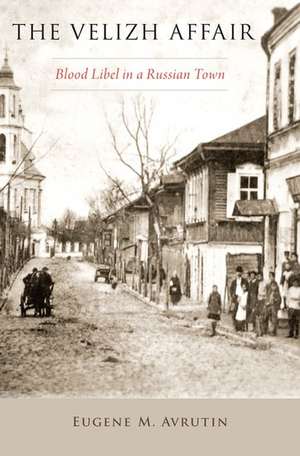The Velizh Affair: Blood Libel in a Russian Town
Autor Eugene M. Avrutinen Limba Engleză Hardback – 28 dec 2017
| Toate formatele și edițiile | Preț | Express |
|---|---|---|
| Paperback (1) | 142.10 lei 10-16 zile | |
| Oxford University Press – 12 iul 2022 | 142.10 lei 10-16 zile | |
| Hardback (1) | 281.87 lei 31-37 zile | |
| Oxford University Press – 28 dec 2017 | 281.87 lei 31-37 zile |
Preț: 281.87 lei
Preț vechi: 332.42 lei
-15% Nou
Puncte Express: 423
Preț estimativ în valută:
53.94€ • 55.73$ • 44.87£
53.94€ • 55.73$ • 44.87£
Carte tipărită la comandă
Livrare economică 08-14 martie
Preluare comenzi: 021 569.72.76
Specificații
ISBN-13: 9780190640521
ISBN-10: 0190640529
Pagini: 248
Dimensiuni: 239 x 155 x 25 mm
Greutate: 0.48 kg
Editura: Oxford University Press
Colecția OUP USA
Locul publicării:New York, United States
ISBN-10: 0190640529
Pagini: 248
Dimensiuni: 239 x 155 x 25 mm
Greutate: 0.48 kg
Editura: Oxford University Press
Colecția OUP USA
Locul publicării:New York, United States
Recenzii
The Velizh case undoubtedly deserves this rich and detailed analysis. Avrutin inte-grates this Russian instance of a blood libel in the long trajectory of such accusations and de?nes its speci?c character with great expertise. The reader will gratefully acknowledge the outstanding amount of research that went into this volume. It will be of interest to an academic audience interested in Russian, legal, and administrative history and to those members of the general public with a keen interest in Jewish history in eastern Europe, and in the history of anti-Jewish prejudice.
[A] scholarly work that reads as a riveting novel
Meticulously researched, fluently written, and thoughtfully argued. The Velizh Affair explores one of Imperial Russia's most fascinating, troubling, indeed infuriating legal cases: an accusation of Jewish 'ritual murder' that seemed to have been adjudicated in a year but, instead, dragged on for another eleven, during which time more than forty Jews were imprisoned and the deep fissures in the Russian-Jewish relationship laid bare.
A refreshingly original work of scholarship that draws on previously inaccessible Russian archival material in the telling of a gripping, gruesome story. Avrutin shows himself to be among the finest modern Jewish social historians of his generation.
During the reign of Tsar Nicholas I, just a decade after Napoleon's ill-starred march on Moscow, the grisly murder of a boy in the Russian town of Velizh brought forth portentous accusations that the Jews had committed blood libel. Based on a remarkably rich, long-ignored source, Eugene Avrutin reconstructs the murder case with great sensitivity, erudition, and a feel for the temper of the time. Piecing together the everyday life of the town, the belief systems that fueled the accusations, and the dynamic between local rivalries and outside politics that made the Velizh Affair history's longest running blood libel accusation, Avrutin offers a compelling explanation, rendered in clear, elegant prose, for how such allegations--otherwise so similar to witchcraft accusations--survived and even flourished in the modern world.
The Velizh Affair is a noteworthy example of microhistory that sheds light onto broader issues of the history of Nicholaevan Russia and its Jewish past, paradoxically both reinforcing and challenging common stereotypes about this expansive state, its bureaucracy, and its culture.
[A] devastating and evocative tale of magic and everyday life in small town Russia... To conjure up this belief system and the power it exerted as vividly and persuasively as Eugene Avrutin does is no mean feat of historical imagination.
[A] scholarly work that reads as a riveting novel
Meticulously researched, fluently written, and thoughtfully argued. The Velizh Affair explores one of Imperial Russia's most fascinating, troubling, indeed infuriating legal cases: an accusation of Jewish 'ritual murder' that seemed to have been adjudicated in a year but, instead, dragged on for another eleven, during which time more than forty Jews were imprisoned and the deep fissures in the Russian-Jewish relationship laid bare.
A refreshingly original work of scholarship that draws on previously inaccessible Russian archival material in the telling of a gripping, gruesome story. Avrutin shows himself to be among the finest modern Jewish social historians of his generation.
During the reign of Tsar Nicholas I, just a decade after Napoleon's ill-starred march on Moscow, the grisly murder of a boy in the Russian town of Velizh brought forth portentous accusations that the Jews had committed blood libel. Based on a remarkably rich, long-ignored source, Eugene Avrutin reconstructs the murder case with great sensitivity, erudition, and a feel for the temper of the time. Piecing together the everyday life of the town, the belief systems that fueled the accusations, and the dynamic between local rivalries and outside politics that made the Velizh Affair history's longest running blood libel accusation, Avrutin offers a compelling explanation, rendered in clear, elegant prose, for how such allegations--otherwise so similar to witchcraft accusations--survived and even flourished in the modern world.
The Velizh Affair is a noteworthy example of microhistory that sheds light onto broader issues of the history of Nicholaevan Russia and its Jewish past, paradoxically both reinforcing and challenging common stereotypes about this expansive state, its bureaucracy, and its culture.
[A] devastating and evocative tale of magic and everyday life in small town Russia... To conjure up this belief system and the power it exerted as vividly and persuasively as Eugene Avrutin does is no mean feat of historical imagination.
Notă biografică
Eugene M. Avrutin is Associate Professor of History and Tobor Family Scholar in the Program in Jewish Culture and Society at the University of Illinois. He is the author of Jews and the Imperial State: Identification Politics in Tsarist Russia and the coeditor of Ritual Murder in Russia, Eastern Europe, and Beyond: New Histories of an Old Accusation.
